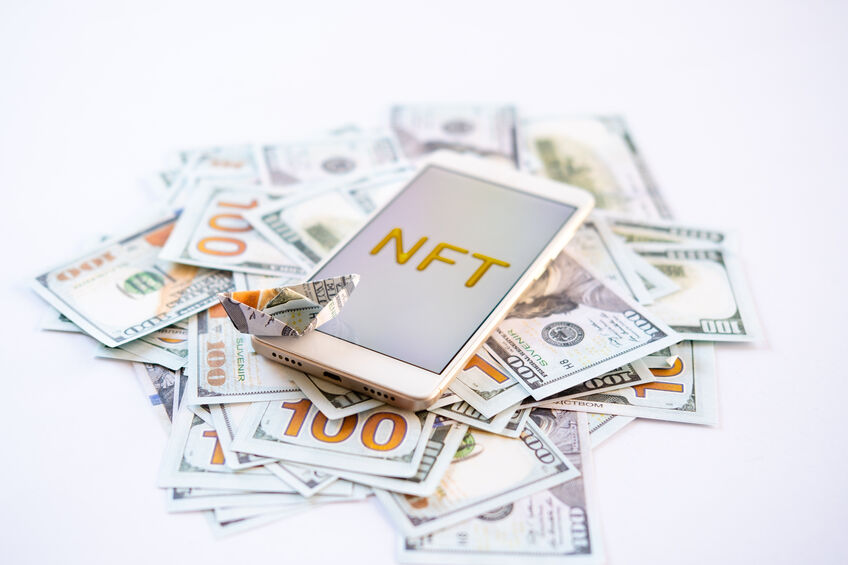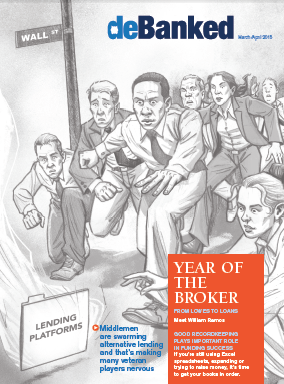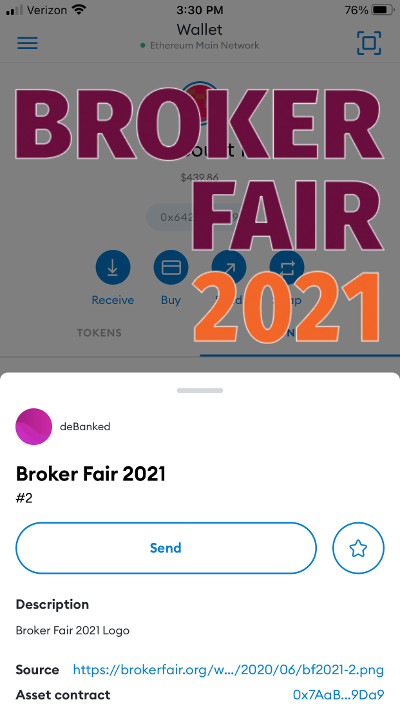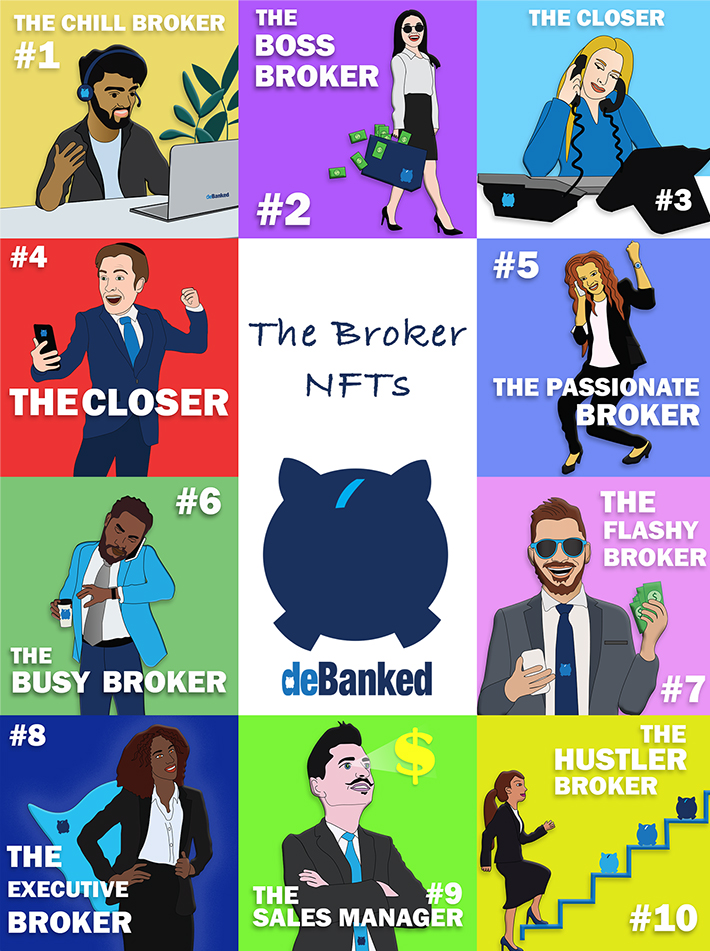cryptocurrency
deBanked Presents: The Broker NFT Collection
October 26, 2021Watch out CryptoPunks, deBanked has minted a limited edition set of its own Broker NFTs.
Drawing from the animated style popular in the NFT community, this collection of ten “brokers” is a diverse light-hearted tribute to the professionals in the business finance industry. Each broker in the collection has been individually minted on the ethereum blockchain.
The artwork was drawn by Cindy Recile and the NFTs minted via deBanked’s own ethereum smart contract. (See here on etherscan.)
The other news is that we’ll be giving some of these away for free. (stay tuned for those details!)
Today’s NFT market has things like pixelated punks and bored apes literally selling for millions of dollars.
A jpeg with no picture other than 4 words of text that say: “Fintech is Killing me,” is currently up for sale for more than $400, if that can be believed.
The act of minting an NFT cost Ethereum gas but if there is any particular thing you would like to see deBanked turn into an NFT, let us know and maybe we’ll make it happen! Email info@debanked.com.
Miami is Now Making Money Off of Its Own Crypto Coin
October 7, 2021 Francis Suarez, the crypto-crazed mayor of Miami that has attempted to make his city the next center of innovation in the industry, has recently generated more than $7.1M in funding for Miami’s government via MiamiCoin. Arriving in the form of a crypto “donation” to the city, it was all made possible by CityCoins, a nonprofit that allows users to mine coins that the company claims can help the wallets of both coin holders and the cities with whom they look to invest in.
Francis Suarez, the crypto-crazed mayor of Miami that has attempted to make his city the next center of innovation in the industry, has recently generated more than $7.1M in funding for Miami’s government via MiamiCoin. Arriving in the form of a crypto “donation” to the city, it was all made possible by CityCoins, a nonprofit that allows users to mine coins that the company claims can help the wallets of both coin holders and the cities with whom they look to invest in.
According to CityCoins’ website, each time a city launches a new coin, users can mine coins themselves. They are an open-source network that allows developers to create smart contracts on top of the same layer used by Bitcoin, a feature normally reserved for blockchains like Ethereum or Cardano.
“Each time a new CityCoin such as MiamiCoin launches, 20+ unique wallets are needed to activate the token’s mining process,” the site reads. “Once this happens, a 150 block (~24 hour) countdown begins, signaling the start of the CityCoins’ mining process at the end of the countdown period. From there, anyone is eligible to participate in the CityCoins mining process within a given Stacks block and be rewarded for their contributions.”
The system creates a bidding process, sending Stack tokens to the chosen city’s smart contract for a specific block. The more Stack tokens that are sent to the contract, the more likely a user is to win rewards for that block. This creates a system where anyone can compete for the coins, as the process of mining a CityCoins product is completely free of any type of hardware.
Thirty percent of miners’ forwarded Stacks is directed into a crypto wallet for the respective city, and the remaining 70% can be used to earn Stacks or Bitcoin. Winners of the coins through CityCoins’ mining process, are chosen by a Verifiable Random Function (VRF) that takes into account the number of Stacks sent to specific contracts.
Anyone would be forgiven if the process and potential utility sounds convoluted. It becomes even more so after examining what exactly a “Stack token” is.
Stacks, a type of blockchain token originated into existence in 2019, were previously registered as securities with the SEC, a rarity in the crypto space. The company that issued them, however, has since changed course and has chosen to no longer register them. This was based upon the company’s own legal opinion, not the SEC’s.
Bottom line: However this CityCoins systems works and whatever the reasons why anyone would participate in it, it has somehow managed to yield more than $7 million for the city of Miami.
While everyone today likes to focus on the negative and want to create conflict and division…We made 1 million dollars on Miami Coin…TODAY…think about that! https://t.co/Ycbwre6Wss
— Mayor Francis Suarez (@FrancisSuarez) October 1, 2021
When speaking about the city’s involvement in becoming a fintech hub with The Floridian, Suarez credited timing to why his city is becoming the go-to spot for fintech businesses to flock. “We had an opportunity,” Suarez said. “You had cities across America, urban cities, pushing out innovators through taxation policies, sometimes elected officials saying “F” Elon Musk, or Amazon picks New York and they push them out.”
Suarez, a member of the Florida BlockChain Task Force, also credited his December 2020 viral tweet as a reason for tech’s attraction to Miami. Suarez answered a tweet with “how can I help?” after a user took to Twitter asking people if they believed Silicon Valley should move to Miami. “It was so counter-narrative to the way elected officials were dealing with technology and technologists,” he said, in reference to the Tweet.
According to Suarez, the city’s focus on crypto and fintech has made Miami a tech-trendsetter for other cities. Thanks to tech’s arrival, Miami is the first city to pursue paying workers in Bitcoin, the first to allow citizens to pay taxes in Bitcoin, and hitting huge numbers in the city’s job market. According to Suarez, the city added 8,000 jobs with an average annual salary of $120,000 in the past nine months.
“For the first time in [Miami’s] history, we are now creating high paying jobs,” Suarez said.
Fake Press Release Announced That SEC Had Dropped Case Against Ripple
October 1, 2021 XRP, the digital assets tied to Ripple, surged this morning from a price of $0.95 to $1.04 on the supposed announcement that the SEC had dropped its lawsuit against Ripple.
XRP, the digital assets tied to Ripple, surged this morning from a price of $0.95 to $1.04 on the supposed announcement that the SEC had dropped its lawsuit against Ripple.
The news came via press release service Accesswire in the headline “SEC vs Ripple Legal Fight is Over.” Other news outlets immediately picked it up, including Yahoo, and it made its way to the top of Google’s search results.
The problem is that the entire press release was fake.
“Ripple, the leading provider of enterprise blockchain and cryptocurrency solutions for global payments, is pleased to announce that the SEC vs RIPPLE legal battle is finally over,” it began. “The lawsuit that lasted over ten months has finally been settled between the Securities and Exchange Commission (SEC) and the cryptocurrency company Ripple. The SEC has announced it would drop its charges.”
Accesswire deleted it as did Yahoo. deBanked obtained it via archive.org. Merely googling: ripple sec, however still shows the fake headline as the top result.
The public may not be fully aware that the news is false yet, if the price is any indication. It’s still trading at $1.04 as of the time this story is being written.
Two weeks ago, GlobeNewsWire fell victim to a similar scheme, when it distributed a fake announcement that Walmart would begin accepting Litecoin.
Small Business Finance Industry Mulls Crypto, NFTs
September 16, 2021 As the crypto craze roars on, NFTs are starting to stake a claim in the finance world as a legitimate option for those looking to invest or stash money in a virtual space. The sports world recently took their swing at NFTs, and here at deBanked we minted NFTs of our own early this week. It seems that NFTs have sparked the interest of the media, athletes, and art enthusiasts— but in small business finance, the conversation is only in the early stages.
As the crypto craze roars on, NFTs are starting to stake a claim in the finance world as a legitimate option for those looking to invest or stash money in a virtual space. The sports world recently took their swing at NFTs, and here at deBanked we minted NFTs of our own early this week. It seems that NFTs have sparked the interest of the media, athletes, and art enthusiasts— but in small business finance, the conversation is only in the early stages.
“I think of it more not so much as a currency, but from what I’ve been reading, more of an investment vehicle,” said Noah Grayson, President of South End Capital, when asked what he thinks an NFT represents. “It’s a way for people to put tangible items in a digital format to get ownership from.”
Grayson says those in his industry have brought up the topic around the office, but it hasn’t made its way into any type of business practices yet. “It’s tough to see how [NFTs] would affect the lending industry at this time, cryptocurrency is something a little more probable in the long term.”
Grayson stressed how difficult small business lending can already be with dollars, and it seems as though the industry just isn’t ready to start conducting business in other types of currencies. “When you consider that many small business owners have no credit score and a large portion of those still pay for things in cash, I think it’s going to be a long time before the industry as a whole considers [crypto] an option to make loans with or compensate partners [with] as a whole,” he said.
“I’d describe it as a digital asset that can be purchased, owned, and used by an individual, giving that individual exclusive rights to the asset,” said James Webster, CEO and founder of ROK Financial when asked how he would define an NFT. “Like any other asset, the price can go up or down over time.”
Although his company has never created an NFT themselves, Webster won’t eliminate the possibility for one in the future. With the interest of the industry and his employees being focused around crypto as of late, Webster can’t keep the crypto and NFT talk out of the office.
 “We have a [clever] and nimble-minded staff at ROK. NFTs and crypto like other tradable assets are always being discussed and invested in here,” said Webster. “The team has been buying crypto for years now and I don’t see that slowing down any time soon.”
“We have a [clever] and nimble-minded staff at ROK. NFTs and crypto like other tradable assets are always being discussed and invested in here,” said Webster. “The team has been buying crypto for years now and I don’t see that slowing down any time soon.”
Webster believes it’ll inevitably make its way into the business with positive effects. “I see it streamlining, as well as making lending and banking for that matter more efficient over time,” he said.
At Velocity Capital Group, crypto has already seeped into the business. The company began offering commission payments to brokers this past August with an immediate positive reception. Velocity Capital Group CEO Jay Avigdor attributes “speed” as the primary use-case of crypto in his business.
“The feedback has been fantastic!” Avigdor said.
With crypto on the minds of fintech gurus everywhere, it’s evident its interest comes from the ability to put the technology in practice. Until these types of things can be borrowed, used to buy goods, or seen as a means of collateral at a mainstream level, the small business finance community will continue to eye their development and evolve if necessary.
IRS Snooping Flexes Government Power, but May Drive Crypto
September 14, 2021 To fight tax evasion, the federal government wants the IRS to track any account in the United States that transacts more than $600 in or out over the course of a year. The tracking will apply to banks and other financial institutions. The feds claim that they will use any found tax dollars to help finance the administration’s new $3.5 trillion spending plan.
To fight tax evasion, the federal government wants the IRS to track any account in the United States that transacts more than $600 in or out over the course of a year. The tracking will apply to banks and other financial institutions. The feds claim that they will use any found tax dollars to help finance the administration’s new $3.5 trillion spending plan.
Such a move could push a suspicious populace into crypto, where records, however openly recorded on blockchains, could potentially obscure the parties involved.
Banks have fought against the government’s push to share account transactions, as they argue it will be a major invasion of privacy. This will undoubtedly create an entire new workload for them as well, as the banks will have to provide intricate details on most of the accounts on their books — an unprecedented task.
“I don’t believe that much is going to change,” said Yoel Wagschal, a CPA. Wagschal stresses to his clients to always live their life as if the government has access to the information about their spending habits for the sake of their wellbeing.
“The issue at hand is how far this is going to [go], how far the government’s reach will be,” said Wagschal. “When a government body gets power, they don’t give it back. Look at the power wagon they are on.”
As crypto becomes more of an avenue to store and invest money, it may also be a new channel for coin holders to keep their finances shrouded behind additional layers from the federal government.
Brokers Say “Yes” to Commissions in Crypto
September 12, 2021 One month after Velocity Capital Group began offering broker commissions in crypto, CEO Jay Avigdor says it is taking off. It’s completely optional of course, but already seven of VCG’s ISOs have opted to get paid that way.
One month after Velocity Capital Group began offering broker commissions in crypto, CEO Jay Avigdor says it is taking off. It’s completely optional of course, but already seven of VCG’s ISOs have opted to get paid that way.
“The feedback has been fantastic!” Avigdor says.
In a previous interview with deBanked, Avigdor said that the initiative wasn’t about speculating on cryptocurrencies but instead about taking advantage of the transaction speed. Crypto can change hands faster than an ACH or a wire, for example, and VCG will send funds via a stablecoin so that there is no volatile exchange rate risk.
“Our goal since day 1 of VCG, was to give ISOs and merchants the ability to access capital as fast as possible,” Avigdor said. “With VCG’s proprietary technology, we have been able to change that mindset from ‘as fast as possible’ to ‘the FASTEST possible.’”
One broker attested on facebook that he received his commission from VCG within 5 minutes from the moment the deal funded via the DAI stablecoin.
Even a merchant requested that they be funded with crypto, according to Avigdor, which they accommodated. Payments back to VCG are still done via ACH debit, however.
The market cap of the cryptocurrency industry is currently at more than $2 trillion.
deBanked Mints NFTs, Puts First Magazine Cover on the Ethereum Blockchain
September 12, 2021 deBanked has been forever etched into the Ethereum blockchain.
deBanked has been forever etched into the Ethereum blockchain.
The first print magazine cover ever published by deBanked has been turned into an NFT. Over the weekend, deBanked deployed its own NFT smart contract on to Ethereum and minted several NFTs including the deBanked logo and the Broker Fair 2021 logo. The exercise was prompted by a deBanked TV discussion about athletes selling “digitally-signed” memorabilia.
“I think it’s important that as we talk about this technology, that we fundamentally understand how it all works,” said deBanked President Sean Murray. “There are some drag-and-drop style NFT ‘makers’ online, but I thought that would defeat the purpose, so I did it all through the Terminal. Once I got our NFT smart contract on the Ethereum mainnet, I minted a handful of NFTs with it.”
Murray, who started using and mining crypto in 2014, has offered Bitcoin as a deBanked customer payment option for more than 6 years.
Although the NFT contract and token IDs are visible on etherscan.io, images themselves are not. Users need a particular wallet or app that is equipped to display NFTs.
 “It’s a somewhat strange system in which these tokens basically contain metadata with a URL to where the images are hosted somewhere else online. So you need something that’s interpreting the metadata,” Murray said.
“It’s a somewhat strange system in which these tokens basically contain metadata with a URL to where the images are hosted somewhere else online. So you need something that’s interpreting the metadata,” Murray said.
Using a mobile wallet like MetaMask can accomplish this, but so can a quick web tool like deBanked’s NFT Viewer.
Murray added that there’s actual costs involved too.
“A lot of people are joking about how someone paid $1.3 million for a picture of a rock,” he said, “but it does cost money by way of eth to mint an NFT. It could cost someone more than $100 just to put a single NFT on Ethereum so selling an NFT, even if it’s something silly, could fetch a significant price by virtue of the high transaction fees on the network.”
 Network fees are a known obstacle. NFTs on the sports star operated Autograph.io are minted on the Polygon blockchain where costs are lower, for example. Autograph boasts that anyone can buy “digitally signed autographs” from celebrities like Tom Brady, Derek Jeter, and Wayne Gretzky.
Network fees are a known obstacle. NFTs on the sports star operated Autograph.io are minted on the Polygon blockchain where costs are lower, for example. Autograph boasts that anyone can buy “digitally signed autographs” from celebrities like Tom Brady, Derek Jeter, and Wayne Gretzky.
Minting an NFT or two or three, or as many as one wants, is as simple as pressing a button once a proper script is written. Interested collectors would have to establish just how genuinely or intimately signed an autograph is and how rare it is. Is it an agent executing a script? Is it the celebrity pressing a button? Or could it be that the image itself is unique and that the seller drew or signed it with their own hand in Adobe Photoshop or something similar? As the mysteriousness of the technology becomes more understood, the market may become more cost normalized.
Murray says that the smart contract is still accessible so that there is the potential to mint more deBanked-originated NFTs in the future and that deBanked NFTs can also be sent to others that have Ethereum-equipped wallets.
“I think 2021 is as good a year as ever for Broker Fair in particular to be memorialized into Ethereum,” Murray said. “What better way than to be on the forefront of technology in the commercial finance space?”
The Sports World Is Going Nuts for Crypto
September 9, 2021 Miami Mayor Francis Suarez wants NFL Quarterback Tom Brady to know that he’s totally in to crypto.
Miami Mayor Francis Suarez wants NFL Quarterback Tom Brady to know that he’s totally in to crypto.
Strange times as it may be, and stranger yet with a new TV commercial that has Brady communicating agreeably with New York Jets super fan Fireman Ed, the cool place to be is “in crypto.” That’s the substance of a commercial for FTX, an international cryptocurrency exchange with a US operation known as FTX US.
Hey @GiseleOfficial @StephenCurry30 @Trevorlawrencee @mlb @kevinolearytv @LCSOfficial @MiamiHEAT @riotgames @TSM @stoolpresidente, you in? @ftx_official #FTXyouin pic.twitter.com/tGsQzgFJvs
— Tom Brady (@TomBrady) September 8, 2021
FTX already has the naming rights to Miami’s major sporting arena that is home base for the NBA’s Miami Heat. That arrangement excited the likes of Mayor Suarez, who has jumped on the crypto bandwagon so heavily that he actually launched his own crypto conference back in June.
On the other side of the country, Golden State Warrior powerhouse Steph Curry, announced he had signed on as an FTX partner/spokesperson.
“I’m excited to partner with a company that demystifies the crypto space and eliminates the intimidation factor for first-time users,” Curry said in a release.
Curry was one of several celebrities (including Brady’s supermodel wife Gisele Bundchen who also stars in it) that Tom Brady tagged in a tweet promoting his commercial.
“Whatever you do… don’t laser eyes!” Brady separately tweeted to Curry, a joke at the fact that crypto’s twitterverse has adopted “laser eye” profile pics to signal to others that “they’re in.” Brady is no different. Though his account profile description is short and to the point, “Family and Football,” his red laser-eyed pic is a signal that FTX and crypto are not just another random endorsement deal.
Brady is also a co-founder & co-chairman of the Board at Autograph, for example, a blockchain-based NFT autograph site that is currently selling digitally signed Derek Jeter autographs at high prices.
“NFTs bring an entirely new dimension to the collector experience, and I cannot wait for people to discover and engage with this first ever drop of Autograph’s official digital collectibles,” Brady said in a public statement about the company. “We created Autograph as a way for fans and collectors to own a piece of iconic moments in sports and entertainment through authenticated and official digital collectibles and we are just getting started!”






























